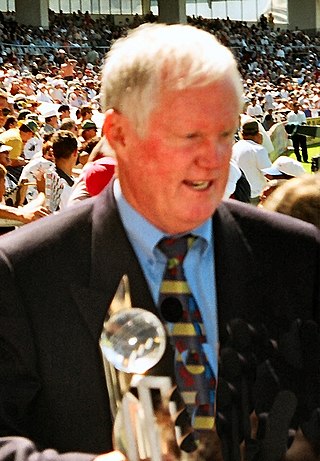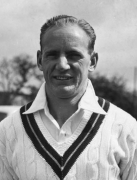Related Research Articles

Ellis Park Stadium is a rugby union and association football stadium in the city of Johannesburg, Gauteng Province, South Africa. It hosted the final of the 1995 Rugby World Cup, which was won by the country's national team, the Springboks. The stadium was the country's most modern when it was upgraded in 1982 to accommodate almost 60,000 people. Today, the stadium hosts both football and rugby and is also used as a venue for other large events, such as open-air concerts. It has become synonymous with rugby as the only time when rugby was not played at Ellis Park was during 1980 and 1981, when the stadium was under construction during the upgrade.

Robert Graeme Pollock is a former cricketer for South Africa, Transvaal and Eastern Province. A member of a famous cricketing family, Pollock is widely regarded as one of South Africa's greatest ever cricketers, and as one of the greatest batsmen in the history of cricket. Despite Pollock's international career being cut short at the age of 26 by the sporting boycott of South Africa, and all but one of his 23 Test matches being against England and Australia, the leading cricket nations of the day, he broke a number of records. His completed career Test match batting average of 60.97 remains the third best behind Sir Don Bradman and Adam Voges.
International cricket in South Africa between 1971 and 1981 consisted of four private tours arranged by English sports promoter Derrick Robins, two tours by a private team called the "International Wanderers", and one women's Test match. The apartheid policy followed by the South African Governments of the day meant that no Test match playing nation was willing to tour, thereby depriving world cricket of leading stars such as Graeme Pollock, Barry Richards, Clive Rice and Eddie Barlow.

The CSA 4-Day Domestic Series is the domestic first class cricket competition of South Africa. The tournament is contested by teams from all nine provinces of South Africa.
Illovo is a suburb of Sandton, South Africa. It borders Hyde Park, Sandhurst, Inanda and Melrose. Illovo is sought-after and home to many young professionals and creatives because of its close proximity to Sandton and Johannesburg business centres and many affordable apartment blocks. It is located in Region E of the City of Johannesburg Metropolitan Municipality.
This article describes the history of South African cricket from the aftermath of the First World War in 1919 to the end of the Second World War in 1945.
Alfred Henry Cecil Cooper was a South African cricketer who played a single Test match for the South African national side during the 1913–14 season. Domestically, he played for Transvaal from 1912 to 1928.

Edward Russell Henry Fuller was a South African cricketer who played in seven Test matches between 1953 and 1957. He was born in Worcester, Western Cape and died in Milnerton, Cape Town.

When the First World War ended in November 1918, thousands of Australian servicemen were in Europe as members of the First Australian Imperial Force (AIF) and many remained until the spring of 1919. In England, a new first-class cricket season was planned, the first since 1914, and an idea that came to fruition was the formation of an Australian touring side made up of servicemen. Agreement was reached with the Australian Corps HQ in London, commanded by Field Marshal William Birdwood, 1st Baron Birdwood, and the Australian Imperial Force Touring XI was formed, initially under the captaincy of pre-war Test player Charlie Kelleway. Kelleway departed after only six matches following a dispute about the fixtures list. A players' meeting elected future Test player Herbie Collins as team captain for the remainder of the tour, despite the fact that Collins' military rank was lance corporal and there were seven officers in the party. The bulk of the team remained intact for nearly nine months from May 1919, playing 33 matches in Great Britain, ten in South Africa on their way home and then another three in Australia itself before disbanding in February 1920. Of the 46 matches, 39 are adjudged first-class and the team had only four defeats, all of these in England. The players lived on their army pay and all profits from gate money went to an AIF Sports Control Board.
The history of cricket in Zimbabwe, formerly Rhodesia and before 1965 Southern Rhodesia, includes Rhodesia first forming a first-class cricket team in August 1890, and the inaugural Test appearance of Zimbabwe in October 1992.
This article describes the history of South African cricket from its known beginnings until the end of the First World War in 1918.
Northerns has played first-class cricket in South Africa since December 1937. Its territory is the area north of Johannesburg, and it includes Pretoria.
This article describes the history of South African cricket from the end of the Second World War in 1945 to the start of South Africa's cricket isolation in 1970.
This article describes the history of cricket in Pakistan from 1947 to 1970.

The Lenasia Cricket Stadium is a cricket ground in Lenasia, Johannesburg South, South Africa. The ground was used regularly by Transvaal from 1973 until 1991. It has also hosted two women's One Day Internationals, and two youth One Day Internationals.
S. B. Joel's XI cricket team in South Africa in 1924–25 was a team of English cricketers which toured South Africa between November 1924 and February 1925 and played 14 first-class cricket matches and seven other games. The tour was an unofficial one: an official tour of Australia organised by the Marylebone Cricket Club took place at the same time.
A World XI cricket team, which was a multi-national captained by Gary Sobers, toured Australia in the 1971–72 season. It replaced the proposed Test tour by South Africa which the Australian Cricket Board had cancelled in 1971.
Graham Stuart Bunyard was a South African cricketer who played first-class cricket from 1959 to 1963.
Alfred Edward Cooper was a South African cricketer who played at first-class level for Griqualand West and Transvaal).
References
- ↑ "Commonwealth XI in South Africa 1959–60". CricketArchive. Retrieved 1 August 2014.
- ↑ "Transvaal v Commonwealth XI". CricketArchive. Retrieved 1 August 2014.
- ↑ "Combined Transvaal XI v Commonwealth XI". CricketArchive. Retrieved 1 August 2014.
- ↑ "South African Invitation XI v Commonwealth XI". CricketArchive. Retrieved 1 August 2014.